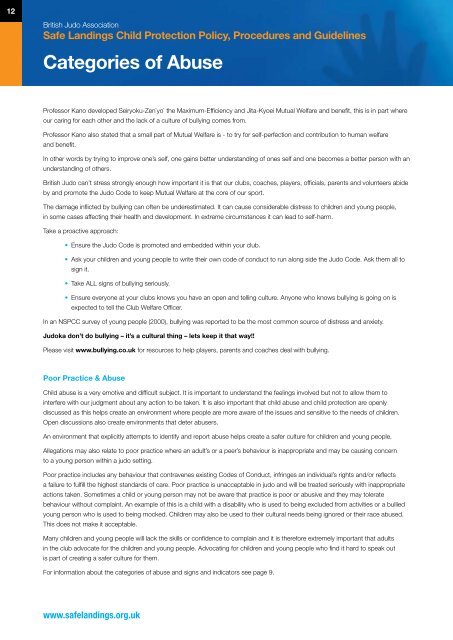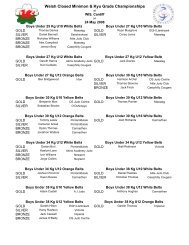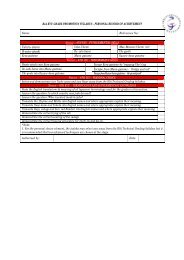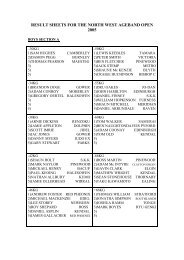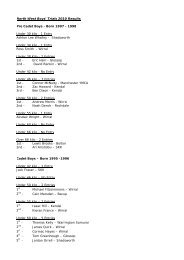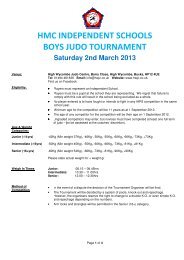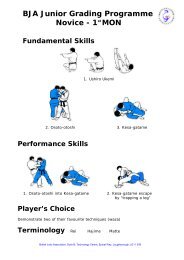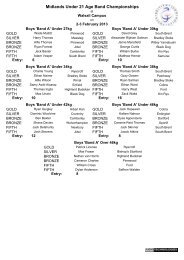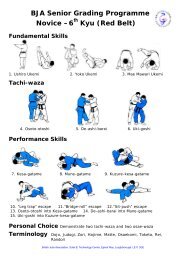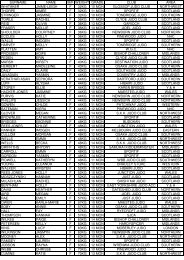Child Protection Policy, Procedures and Guidelines - Judo Scotland
Child Protection Policy, Procedures and Guidelines - Judo Scotland
Child Protection Policy, Procedures and Guidelines - Judo Scotland
You also want an ePaper? Increase the reach of your titles
YUMPU automatically turns print PDFs into web optimized ePapers that Google loves.
12<br />
British <strong>Judo</strong> Association<br />
Safe L<strong>and</strong>ings <strong>Child</strong> <strong>Protection</strong> <strong>Policy</strong>, <strong>Procedures</strong> <strong>and</strong> <strong>Guidelines</strong><br />
Categories of Abuse<br />
Professor Kano developed Seiryoku-Zen`yo` the Maximum-Efficiency <strong>and</strong> Jita-Kyoei Mutual Welfare <strong>and</strong> benefit, this is in part where<br />
our caring for each other <strong>and</strong> the lack of a culture of bullying comes from.<br />
Professor Kano also stated that a small part of Mutual Welfare is - to try for self-perfection <strong>and</strong> contribution to human welfare<br />
<strong>and</strong> benefit.<br />
In other words by trying to improve one’s self, one gains better underst<strong>and</strong>ing of ones self <strong>and</strong> one becomes a better person with an<br />
underst<strong>and</strong>ing of others.<br />
British <strong>Judo</strong> can’t stress strongly enough how important it is that our clubs, coaches, players, officials, parents <strong>and</strong> volunteers abide<br />
by <strong>and</strong> promote the <strong>Judo</strong> Code to keep Mutual Welfare at the core of our sport.<br />
The damage inflicted by bullying can often be underestimated. It can cause considerable distress to children <strong>and</strong> young people,<br />
in some cases affecting their health <strong>and</strong> development. In extreme circumstances it can lead to self-harm.<br />
Take a proactive approach:<br />
• Ensure the <strong>Judo</strong> Code is promoted <strong>and</strong> embedded within your club.<br />
• Ask your children <strong>and</strong> young people to write their own code of conduct to run along side the <strong>Judo</strong> Code. Ask them all to<br />
sign it.<br />
• Take ALL signs of bullying seriously.<br />
• Ensure everyone at your clubs knows you have an open <strong>and</strong> telling culture. Anyone who knows bullying is going on is<br />
expected to tell the Club Welfare Officer.<br />
In an NSPCC survey of young people (2000), bullying was reported to be the most common source of distress <strong>and</strong> anxiety.<br />
<strong>Judo</strong>ka don’t do bullying – it’s a cultural thing – lets keep it that way!!<br />
Please visit www.bullying.co.uk for resources to help players, parents <strong>and</strong> coaches deal with bullying.<br />
Poor Practice & Abuse<br />
<strong>Child</strong> abuse is a very emotive <strong>and</strong> difficult subject. It is important to underst<strong>and</strong> the feelings involved but not to allow them to<br />
interfere with our judgment about any action to be taken. It is also important that child abuse <strong>and</strong> child protection are openly<br />
discussed as this helps create an environment where people are more aware of the issues <strong>and</strong> sensitive to the needs of children.<br />
Open discussions also create environments that deter abusers.<br />
An environment that explicitly attempts to identify <strong>and</strong> report abuse helps create a safer culture for children <strong>and</strong> young people.<br />
Allegations may also relate to poor practice where an adult’s or a peer’s behaviour is inappropriate <strong>and</strong> may be causing concern<br />
to a young person within a judo setting.<br />
Poor practice includes any behaviour that contravenes existing Codes of Conduct, infringes an individual’s rights <strong>and</strong>/or reflects<br />
a failure to fulfill the highest st<strong>and</strong>ards of care. Poor practice is unacceptable in judo <strong>and</strong> will be treated seriously with inappropriate<br />
actions taken. Sometimes a child or young person may not be aware that practice is poor or abusive <strong>and</strong> they may tolerate<br />
behaviour without complaint. An example of this is a child with a disability who is used to being excluded from activities or a bullied<br />
young person who is used to being mocked. <strong>Child</strong>ren may also be used to their cultural needs being ignored or their race abused.<br />
This does not make it acceptable.<br />
Many children <strong>and</strong> young people will lack the skills or confidence to complain <strong>and</strong> it is therefore extremely important that adults<br />
in the club advocate for the children <strong>and</strong> young people. Advocating for children <strong>and</strong> young people who find it hard to speak out<br />
is part of creating a safer culture for them.<br />
For information about the categories of abuse <strong>and</strong> signs <strong>and</strong> indicators see page 9.<br />
www.safel<strong>and</strong>ings.org.uk


